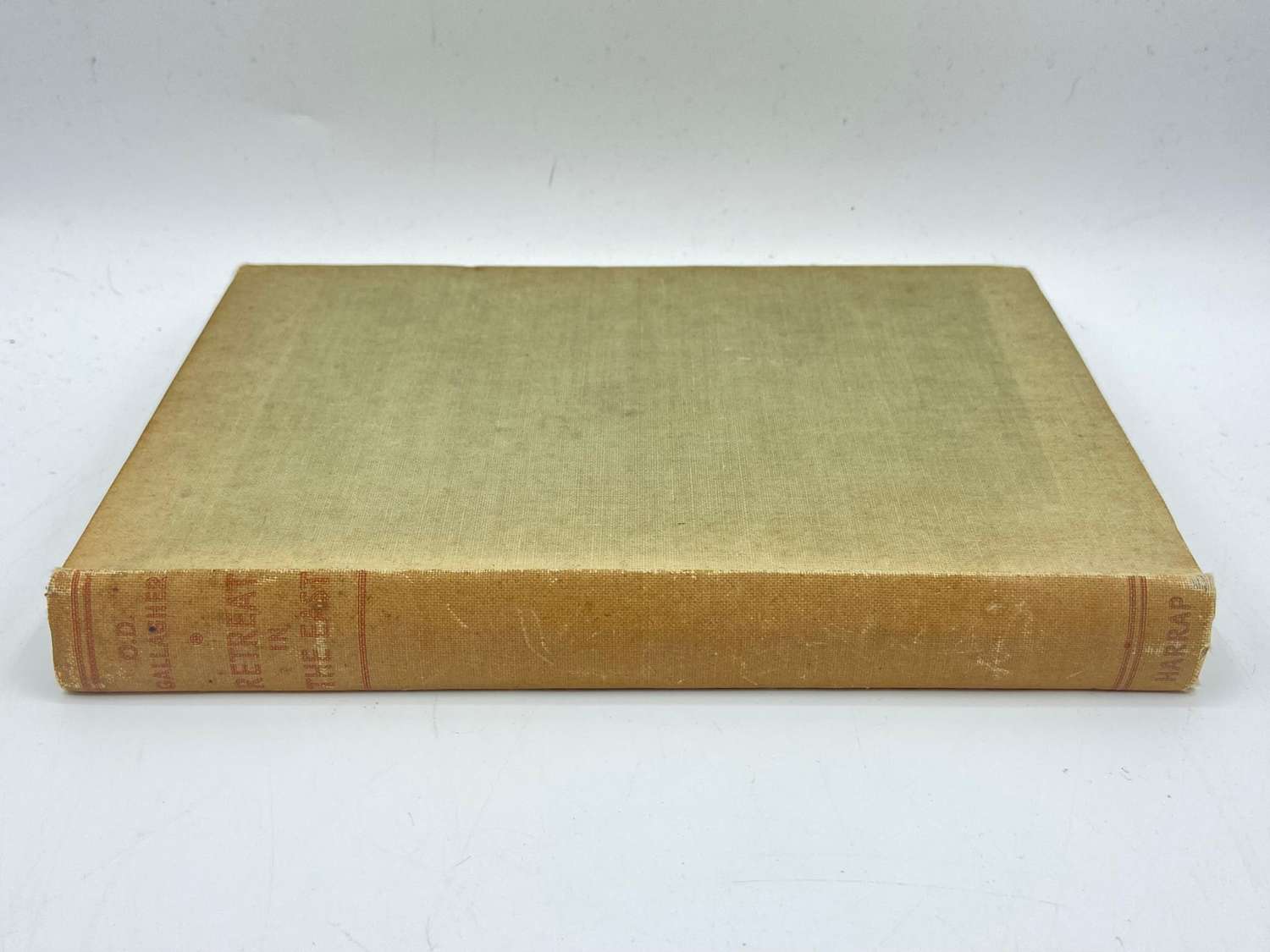
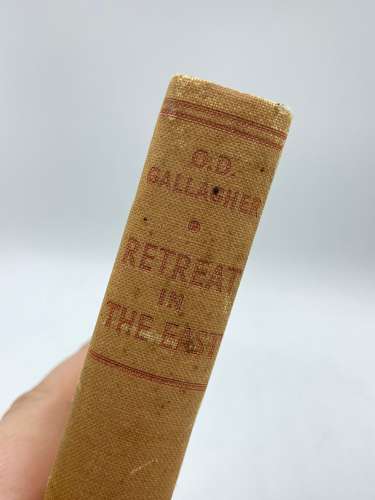
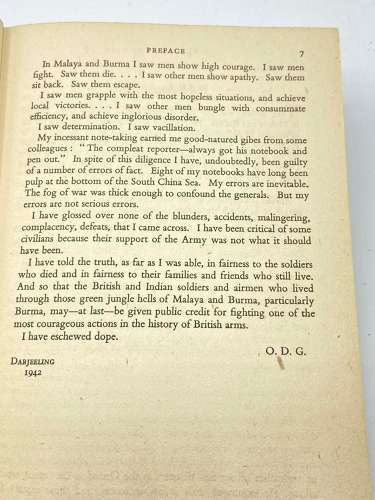

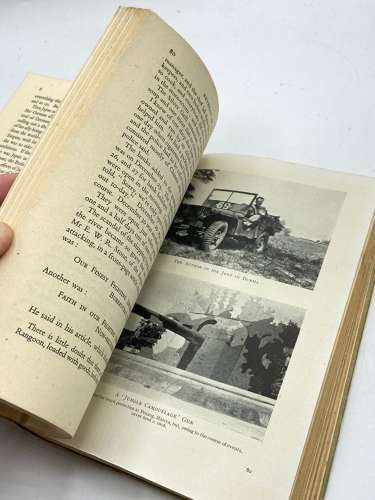



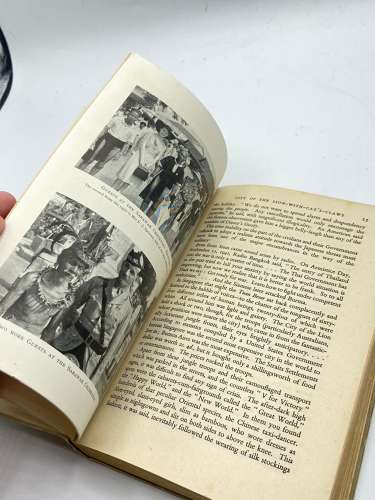
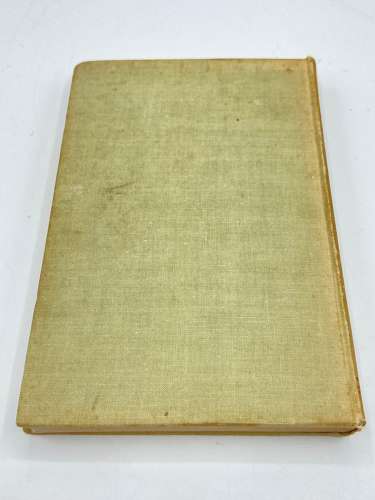







WW2 British Book Titled Retreat In The East By O. D Gallagher 1942
Code: 17896
£15.00 Approx $18.75, €17.52, £15
(1 in stock)
(1 in stock)
Qty
For sale is a WW2 British Book Titled Retreat In The East By O. D Gallagher Published in 1942 (Boom Production War Economy Standard). This is in good condition.
The preface states;
“MISGUIDED, over-optimistic propaganda in the early days of this war (those days characterized by that unattractive period piece, We're going to hang out our washing on the Siegfried Line-if the Siegfried Line's still there .") was given the official cachet by Ironside and Chamberlain, who said Hitler had missed the bus. It was ourselves and our friends who were bluffed, not the enemy. Hitler outflanked the Maginot Line. Then in 1941 the Japanese strutted into the picture, and most of us remembered all we had heard about Britain's mighty naval base at Singapore. So far as the ill-advised, uninspired British propagandists of those earlier days were concerned, there had never before been such an island fortress. The official British propagandists of that time left their successors, those men in office in London immediately prior to and during the Japanese attack, a legacy in the minds of the whole world (except Japan) that Singapore was that non-existent quantity, an uncrackable nut. I remember the official Services' publicity office in Singapore turning out bulletins, almost one a week, announcing the arrival of yet more reinforcements. We reporters had to cable these bulletins to various parts of the world. Reinforcements were arriving almost weekly, but their arrival did little more than build up an army of reasonable size. Obviously we were unable to explain this in our cables, and the result was that the world in general was given the impression that Malaya, and particularly Singapore, was receiving all the attention it rightly deserved. The shock of its collapse was greater than it need have been. And who was responsible for pricking this mighty bubble of im- pregnability?. "A horde of Japanese whose battleships over- turned when they launched them; men who ate polished rice which made them liable to beriberi, and who, therefore, were the world's worst pilots; men who were already fighting a hopeless war against China, a war of many years' standing which had drained their country of its resources of men and material; a nation of fanatics, who were not capable of producing anything original - they had learned everything they knew from the British and the Americans and so on. Balderdash. Then Japan saw her German ally repulsed from the gates of Moscow. Her German ally demanded assistance. Japan (not because she is the tool of Germany) gave it. Japan saw the United States industries rolling out a thunderous war machine. She saw even the possibility of her ally being defeated. She saw that the departure of Nazi Germany from the world-stage would also mean the departure of the Japanese Empire, with its ambitions of world-domination. She plunged into the war to take advantage of her last chance to carry out her vast ambitions. If the United States was allowed time to prepare to enter the war Japan saw herself crushed by the final joint action of the Chinese, the British, the Russians, and the Americans. The effects of Japan's attack on the United Nations were shattering. This nation of little yellow men who make battleships but still practise phallicism exposed the feeble bluff of the British propagandists of the ghastly Siegfried Line period in the first week of the war by sinking Prince of Wales and Repulse in the South China Sea with a loss to themselves of only seven aircraft. They rushed on from victory to victory. Singapore was outflanked like the Maginot Line. The remains of one country after another crashed about the ears of the dazed, misinformed man-in-the-street. It took him a long time and many costly lessons, but at last he began to read the guff of the propagandists with scepticism, and, as a shrewd English newspaperman in India wrote, "There exists to-day a profound, widespread, and justified dislike of dope." I am at this moment still what is called an "officially accredited war correspondent." I wear the uniform of an officer, but I am not allowed to carry a gun. I am "entitled to be treated as an officer," but I am (it should be we are') frequently treated with suspicion by the Services themselves. In spite of this, we frequently have information that comes under the heading" Official Secrets," which rightly we cannot disclose. But in this book I have told as much of the truth of the causes of our first disasters in the Orient as the censor would allow. He expunged only a few sentences, and those mainly for security reasons. In Malaya and Burma I saw men show high courage. I saw men fight. Saw them die. . sit back. Saw them escape. I saw other men show apathy. Saw them I saw men grapple with the most hopeless situations, and achieve local victories. I saw other men bungle with consummate efficiency, and achieve inglorious disorder. I saw determination. I saw vacillation. My incessant note-taking earned me good-natured gibes from some colleagues : The compleat reporter-always got his notebook and 66 pen out." In spite of this diligence I have, undoubtedly, been guilty of a number of errors of fact. Eight of my notebooks have long been pulp at the bottom of the South China Sea. My errors are inevitable. The fog of war was thick enough to confound the generals. But my errors are not serious errors. I have glossed over none of the blunders, accidents, malingering, complacency, defeats, that I came across. I have been critical of some civilians because their support of the Army was not what it should have been. I have told the truth, as far as I was able, in fairness to the soldiers who died and in fairness to their families and friends who still live. And so that the British and Indian soldiers and airmen who lived through those green jungle hells of Malaya and Burma, particularly Burma, may-at last-be given public credit for fighting one of the most courageous actions in the history of British arms. I have eschewed dope. O. D. G.”
This will be sent via royal mail 1st class signed for and dispatched within two working days.
